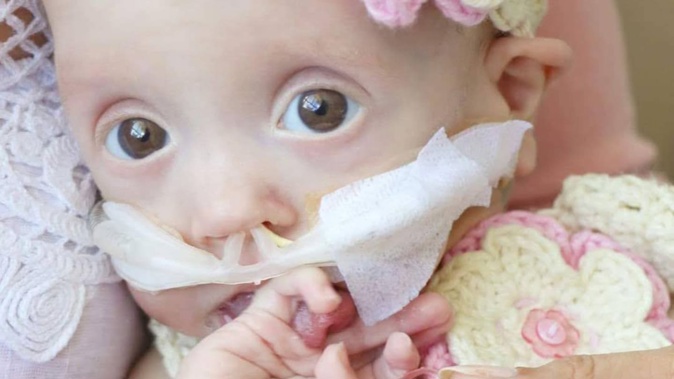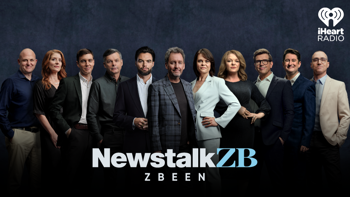
As Lisa Wiggins watched her 19-month-old daughter Isabella Hope die in her arms she was sure she would never feel a more crushing grief and pain.
But almost seven years later she is living a “nightmare” - still waiting for authorities to make a formal ruling on what caused Isabella’s death - and if anyone will be held accountable.
Regardless of whether that happens, Wiggins still has to endure what will likely be a lengthy and harrowing coronial process.
“It’s truly disgusting that we are put through so many years of waiting for answers in such a serious case,” she told the Herald.
“And only to possibly get an apology letter ... it’s truly not good enough, it’s an absolute insult.
“There’s no way that anybody should have to go through this - not knowing what’s happened, and being told different things and then finding out … years later, what happened.”
Isabella died in a children’s hospice in Hamilton on September 27, 2017.
She arrived very early - Wiggins was just 28 weeks pregnant and admitted to Waikato Hospital’s neonatal intensive care unit.
Due to her underdeveloped lungs, Isabella was intubated and ventilated.
After 84 days, Wiggins was able to take her baby home.
 Lisa Wiggins with her daughter Isabella. The baby died in 2017 and Lisa is still seeking answers. Photo / Supplied
Lisa Wiggins with her daughter Isabella. The baby died in 2017 and Lisa is still seeking answers. Photo / Supplied
Isabella failed to gain weight, despite a feeding tube and high-calorie baby formula.
She struggled with breathing and would go blue, cough and gag.
Isabella was born with Noonan syndrome, a genetic condition that affects the heart and growth. The syndrome was picked up at Wiggins’ 12-week scan and one of her older children also has it she knew what to expect.
Initially, it was thought that the syndrome and prematurity combined were at the root of Isabella’s health issues.
Isabella was readmitted to hospital in June and November 2016 and January 2017.
On the third admission, she was 10-and-a-half months old and weighed just 3.88kg. Her medical notes state she was “looking emaciated” and “cachetic”; she was physically wasting away.
Isabella was admitted for the last time on September 22 2017.
She was “very unwell” and “clearly was in severe decline”.
Doctors determined there was nothing more they could do for the baby and Isabella was made a palliative care patient.
She died in her mother’s arms on September 27.
Wiggins posted a tribute video on YouTube several days later, with her favourite photos of Isabella and her family.
“My beautiful baby girl you were the strongest, most courageous little person I’ve ever known,” she wrote.
“You fought so so hard. There are no words to describe how truly amazing you were.
“I miss holding you, the smell of you, your beautiful face, smile and big brown eyes. You lit up any room you were in my precious angel.
“My heart is so broken.”
 Baby Isabella was born at Waikato Hospital in Hamilton. Photo / Alan Gibson.
Baby Isabella was born at Waikato Hospital in Hamilton. Photo / Alan Gibson.
Not long after, Wiggins began to seek answers.
“I was originally told Isabella had a grade four [severe] brain haemorrhage - I was told this while being shown brain scans,” she told the Herald.
“Following this, two doctors told me the brain haemorrhage never happened. I then started seeing ‘birth asphyxia’ on Isabella’s medical records, and this is what was put on her death certificate.”
The death certificate said Isabella died from perinatal asphyxia - a lack of oxygen at birth which had caused a brain injury; epilepsy, chronic lung disease and cerebral palsy - combined with respiratory failure and “extreme failure to grow”.
Wiggins felt uneasy with the conflicting information and after taking advice, filed a claim with ACC around her maternity care
No evidence was found of inadequacies or errors during Wiggins’ pregnancy or Isabella being injured during birth.
ACC then investigated Isabella’s post-birth care. As part of that process, her medical records were sent to top neonatologist Dr Harshad Patel for review.
In January 2021, Patel sent his 15-page report to ACC which provided the information directly to Wiggins’ doctor.
She said the agency felt the report would be incredibly upsetting for her and decided it was better for her to read it with a health professional.
In the report, supplied to the Herald, Patel stated that the ventilation plan put in place for Isabella was “poor” and “incorrect”.
It resulted in the infant having difficulty breathing which in turn had a negative impact on the flow of blood to her brain and blood pressure.
 Isabella's mother is confused by the cause of death listed - as it is at odds with an expert report. Photo / Supplied
Isabella's mother is confused by the cause of death listed - as it is at odds with an expert report. Photo / Supplied
Patel noted nothing was done to change the ventilator for a number of days despite Isabella’s clear “respiratory distress”.
He said when Isabella was a week old an ultrasound revealed a severe brain haemorrhage.
Wiggins was not told about the ultrasound at first and only found out about the bleed later.
Patel confirmed Isabella did not suffer any birth injury.
“The death certificate lists her causes of death as respiratory failure, chronic lung disease, cerebral palsy, prematurity with perinatal asphyxia, epilepsy, extreme failure to grow,” he said.
“These are all accurate but she did not have perinatal asphyxia.”
He was in “no doubt” that her death was the result of a specific chain of events.
“The ventilation strategy was incorrect, and despite several days of respiratory distress whilst on the ventilator, no changes were made to allow her to breathe more comfortably.
“This resulted in significant cardiovascular instability resulting in the intraventricular haemorrhage... The intraventricular haemorrhage therefore resulted in poor feeding due to neurological injury, and the beginning of the pathway to cerebral palsy.”
Respiratory failure and malnourishment followed - and killed her.
“There are many reasons for Isabella’s outcome, but I believe that the process started with her early birth,” Patel’s report states.
“This in itself should not have been an issue … but the mode of ventilation resulted in an intraventricular haemorrhage and neurological injury.”
Patel also highlighted issues in Isabella’s care after her first hospital discharge and identified several times where transferring her to Starship Children’s Hospital was discussed but never actioned.
“There were many times when there were indications to transfer her to a tertiary paediatric unit for assessment of her poor growth but this did not occur,” Patel noted.
“It is unfortunate that she never was transferred to Starship Hospital where I believe her reflux and nutrition would have been assessed and managed appropriately ... the growth was so poor for such long a time, that I believe most general paediatricians would have sent her away for specialist gastroenterology assessment far earlier.”
Wiggins was devastated by Patel’s report.
“The report was an incredible shock to me, I feel so sick even thinking of it - it’s a nightmare come true,” she said.
“I don’t know how this could happen, my little girl Isabella deserved so much better than this.”
After the ACC process was completed in 2021, Wiggins made several complaints to the Health and Disability Commissioner.
She is still waiting for an outcome.
The Coroner will also look into Isabella’s death - but cannot begin that process until the HDC work is complete.
 Isabella Hope Dowd was just 19 months old when she died. Photo / Supplied
Isabella Hope Dowd was just 19 months old when she died. Photo / Supplied
In July 2021 Wiggins was told that “a detailed assessment” of her complaint was under way and the HDC was “at the stage of seeking expert clinical advice”.
On May 1 it was confirmed an expert advisor had been appointed to provide an “independent clinical advice report” to the HDC.
The report was expected by the end of April but the expert had been delayed and requested a time extension.
A senior HDC investigator assured Wiggins the expert had started to write the report, but she could not say when it would be complete.
“I appreciate that this causes further delays in our process,” they said.
The investigator contacted Wiggins again last week with a further update.
“We have received and reviewed the clinical advice report back from the independent expert advisor,” she said.
“The next step in our process will be drafting a provisional decision which I will be assisting the Deputy Commissioner with. Once the provisional decision report is ready to be sent out, I will let you know.
“I appreciate that this has been a long process to date, and we greatly appreciate your ongoing patience.”
The Coroner’s office was also updated by the HDC and will receive the report at the same time as Wiggins.
The Herald sought comment about Isabella’s case from Te Whatu Ora Health New Zealand Waikato.
“As this patient has a complaint before the Health and Disability Commissioner we are unable to comment as it would be inappropriate to pre-empt the outcome of that review,” said a spokesperson.
“As always, we strongly encourage media to await the HDC findings, which include the views of independent clinicians and input from those directly involved in the patient’s care.”
Wiggins said the agency had also refused to discuss anything about Isabella while the HDC inquiry was ongoing.
She said the journey for answers - and the lack of answers to date - had been unacceptably long and hard.
“It’s taken a really long time… It’s appalling…I don’t have the words to explain how that impacts you and how it feels.
“It’s just so traumatising and just seems so unfair.
“And, it’s still all ongoing and there has just been no accountability at all… if it were parents who had [harmed] a child to this degree, it would be totally different.
“I’m angry - so angry. It’s so unjust and I think I just feel really at a loss. And whatever comes out, I’m not holding my breath that it’s going to bring much peace.”
 Lisa with her baby Isabella before she died. Photo / Supplied
Lisa with her baby Isabella before she died. Photo / Supplied
Wiggins has considered abandoning the fight for answers.
She has other children who need her attention - one with high medical needs - and she feels stuck, trapped in her grief.
But she cannot give up.
“I want justice for my little girl, I want accountability,” she said.
“I can see why other people probably give up, but I feel like I can’t. I need to keep doing this for her.
“And another reason I don’t want to give up is because it could help other families … I would hate to see another family go through this.”
Anna Leask is a Christchurch-based reporter who covers national crime and justice. She joined the Herald in 2008 and has worked as a journalist for 18 years with a particular focus on family violence, child abuse, sexual violence, homicides, mental health and youth crime. She writes, hosts and produces the award-winning podcast A Moment In Crime, released monthly on nzherald.co.nz
Take your Radio, Podcasts and Music with you









